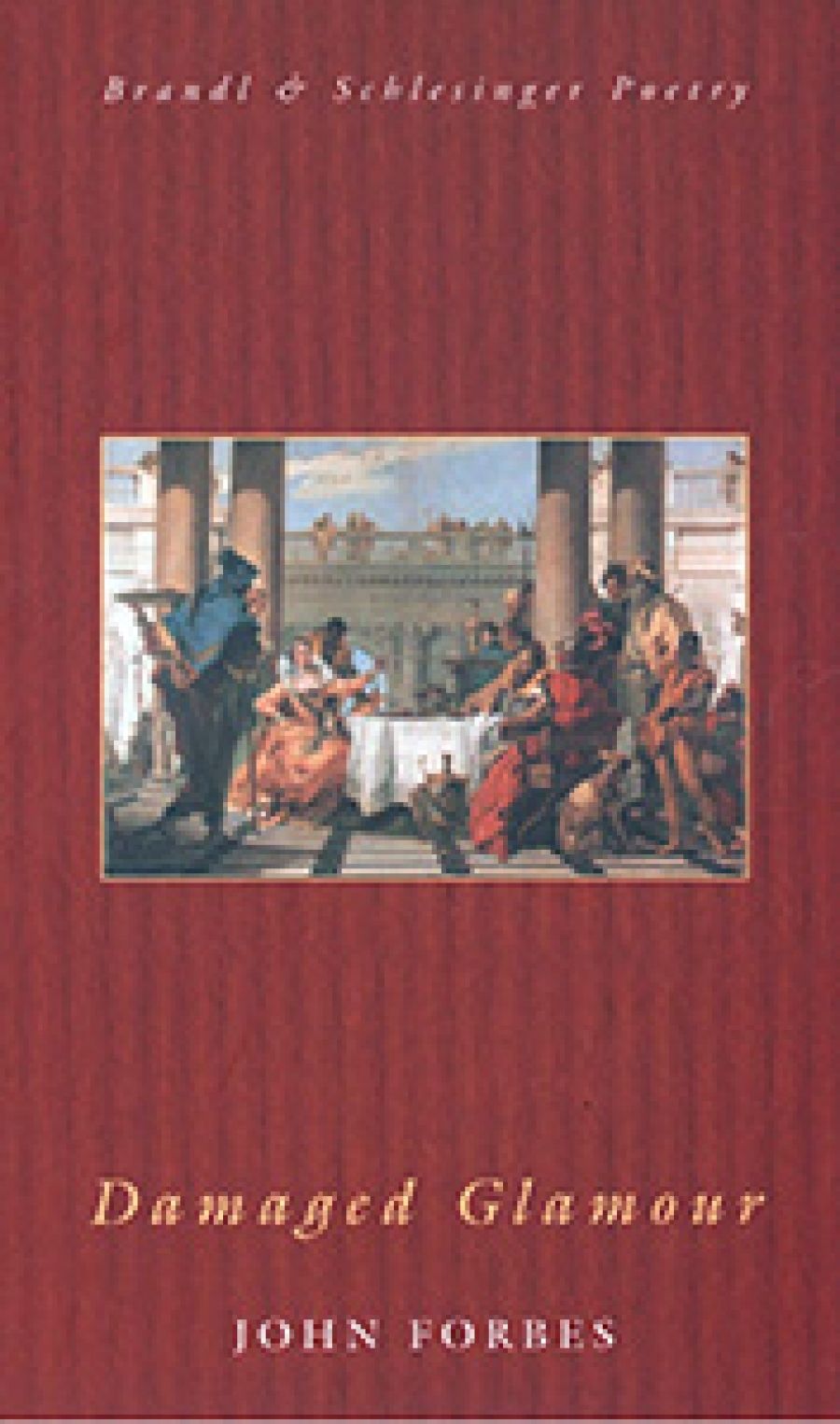
- Free Article: No
- Contents Category: Poetry
- Review Article: Yes
- Online Only: No
- Custom Highlight Text:
The poet John Forbes died suddenly in January 1998. He was not glamorous, but his work was, for reasons that are not immediately apparent. Certainly, he was the most accomplished, along with the immensely learned Martin Johnston, of the young poets who swam into orbit in the 1970s. He was also the writer who most convincingly bridged the gap between a radical art and the relatively conservative, yet difficult, kinds of cultural theory which are expounded in the universities. Such newly collected poems as ‘post-colonial biscuit’, ‘Ode to Cultural Studies’ and ‘Queer Theory’ body forth, in their disembodied way, this concern to be a bridge-maker between academic talk and the melodious realms of poetry.
- Book 1 Title: Damaged Glamour
- Book 1 Biblio: Brandl & Schlesinger, $17.95 pb, 60 pp
It’s a worldly non-world here, ‘the given being just/ imagination’s gloss, / or shimmering’. The posthumously assembled poems in Damaged Glamour, a volume that was once going to be called The Banquet of Cleopatra, after a Tiepolesque lyric which may well be the strongest thing in the collection, are adroit, very knowing, and sometimes plangent. Forbes has also persisted with some corny jokes, like the repeated invocation of someone real or imaginary called ‘the real Mark O’Connor’, but most of the time he is imaginative and free, yoking opposites together without violence, quaintly optimistic, very contemporary, and a dab hand at similes. Just think of ‘whose wounds were like rumours of the rains’ failure’, or of ‘You affect me like running away to sea’. Each ‘like’ is a kind of isthmus: finely accomplished and taut.
Surely it is of the utmost importance for creative artists that they not really believe their own aesthetic agendas. Life keeps creeping back in, if they are any good; what Donald Davie called ‘the stink of the human’ reappears, no matter how hard you try to court the smartarse, PoMo universe. Forbes points this out explicitly in the final section of a suite called ‘Lessons for Young Poets’, but in the penultimate section he has already allowed himself to be more touching, even autobiographical, as it seems to me:
continually disappoint
the expectations of others,
this way you will come to hate yourself
& they will be charmed by your distress
The poems in this collection are always elegant, playing their falling melodies on a large vocabulary. Who else, since the floruit of Auden, could possibly have written ‘Your feelings return / like duped insurgents’? Nobody else, I’m sure, could have come up with ‘IRA Dreaming’, a poem which reads much more surely now than it did in an earlier draft. And ‘Spleen’ reminds us how deeply Forbes has ingested his Baudelaire, bringing the Parisian flâneur back to half-life in the ultramodern city with its discos, Amex slips and information systems. It’s good to see, too, that there’s a late elegy for Martin Johnston here: salute to an intellectual peer, without being pompous about it, or soppy.
The very last line in Damaged Glamour reads as though Forbes had seen Slasher Reith’s plot with Patrick Stevedores coming, and seen it succeeding. It reads: ‘if we still had works, or unions, that is.’ The political commitment of Forbes’ project is there, all right; and at the same time the weak final clause is the Debussian termination of his lightly-fingered music. Lightness is something he was always very good at, despite an occasional clunking popness. His mastery was of syntax as rhythm: of the hemistich, the hiatus, the catch of breath when an anxious sentence changes direction over a line-ending. We can feel his inimitable magic in such moments as’& we move together, draped in the planet’s / tingling aurora, thanks to our huge, / / electric shoes.’
At my back, reading Forbes, I always hear his growling distress at a review I wrote in Scripsi of one of his early volumes. Turning to me in a corridor, he said that he wanted to strangle me. I replied mildly that I thought the review was entirely favourable. He said in turn that it was like James Mason on the conning tower of a submarine, smiling sardonically. I trust that his shade will not be dissatisfied with what I have written here. He was one of those who worked in the Mallarméan vacuum, of which Sartre asked,
what can they work with, if not words which chance has stuck together in their minds according to some archaic affinity whose influence lingers on, long after the original meaning has been forgotten?
He was utterly contemporary, but he was also a fan of Anglo-Saxon Christendom: he was touched by Latin culture and its lingering traces.
This is a book by a fine, genuinely idiosyncratic poet, one whose delicately flamboyant similes will live on, bearing witness to what was best in postmodernism. His Cleopatra poem will become a curious kind of Australian classic, like his early ‘Four Heads, & how to do them’.


Comments powered by CComment